Comparative Analysis: Advocacy for International Student Mental Health
VerifiedAdded on 2022/09/06
|12
|2786
|20
Report
AI Summary
This report addresses the critical issue of mental health among international students in Australian higher education. It begins with an executive summary and provides a comprehensive background on the problem, highlighting the stressors faced by international students such as lack of support networks, language barriers, and acculturative stress. The report then analyzes Mental Health Australia's role and initiatives. The core of the report lies in its comparative analysis of two models of advocacy (peer and systemic) and two models of social action (social institutional and conscientization). It evaluates the strengths and weaknesses of each model, ultimately recommending peer advocacy and the conscientization model as the most effective approaches for supporting international students' mental health. The report emphasizes the need for comprehensive policies and programs to address this growing concern and concludes with recommendations for Mental Health Australia to implement these models.
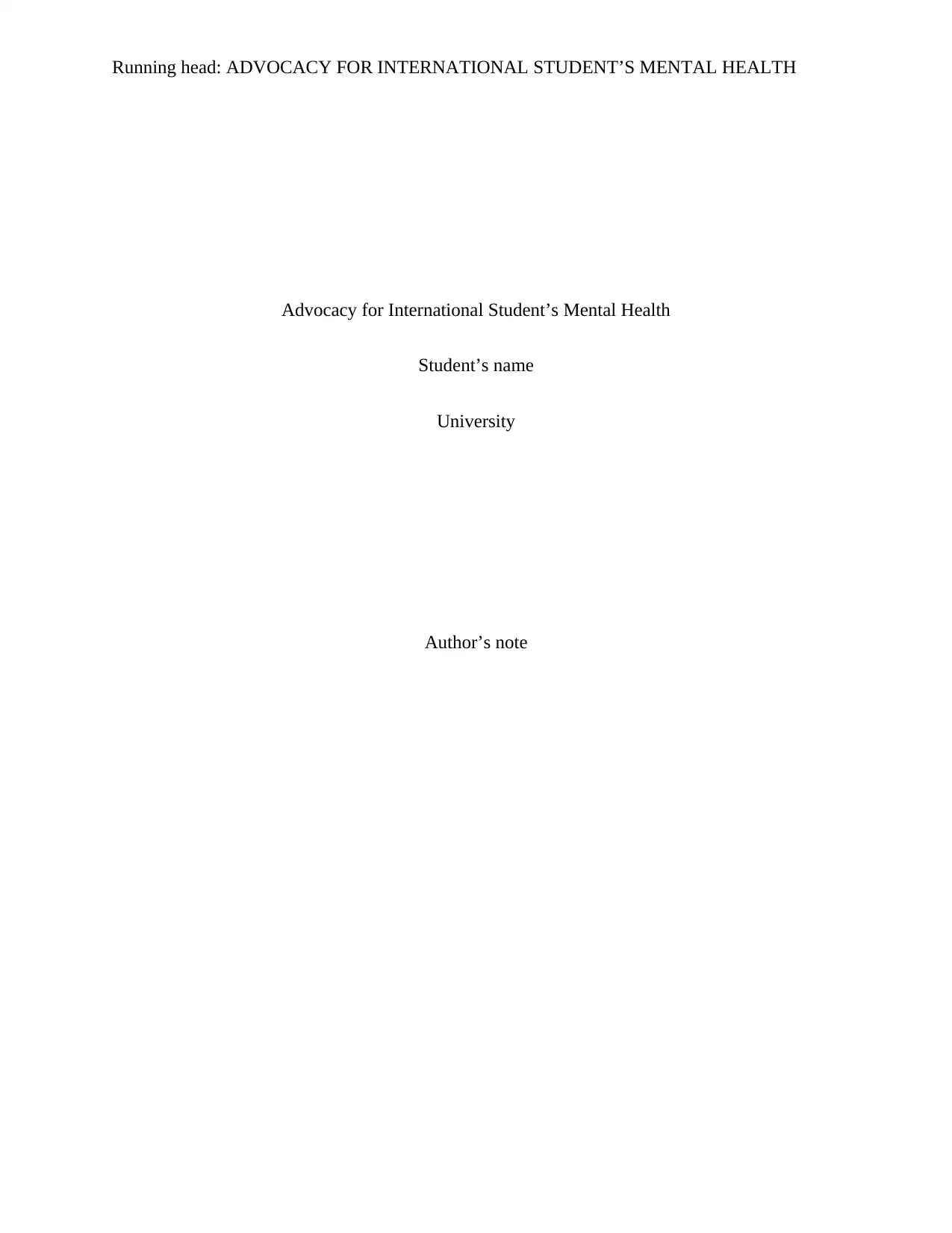
Running head: ADVOCACY FOR INTERNATIONAL STUDENT’S MENTAL HEALTH
Advocacy for International Student’s Mental Health
Student’s name
University
Author’s note
Advocacy for International Student’s Mental Health
Student’s name
University
Author’s note
Paraphrase This Document
Need a fresh take? Get an instant paraphrase of this document with our AI Paraphraser
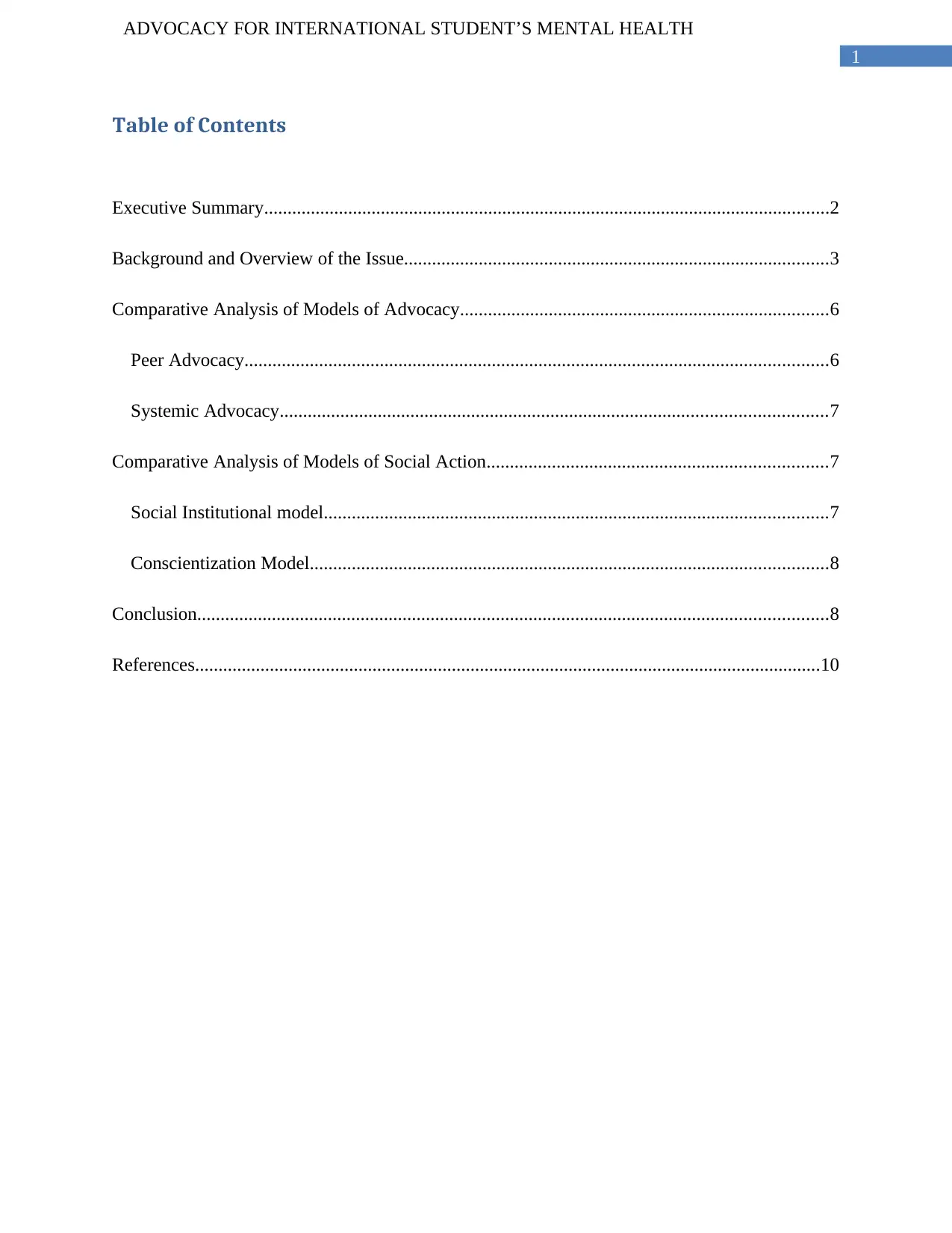
1
ADVOCACY FOR INTERNATIONAL STUDENT’S MENTAL HEALTH
Table of Contents
Executive Summary.........................................................................................................................2
Background and Overview of the Issue...........................................................................................3
Comparative Analysis of Models of Advocacy...............................................................................6
Peer Advocacy.............................................................................................................................6
Systemic Advocacy.....................................................................................................................7
Comparative Analysis of Models of Social Action.........................................................................7
Social Institutional model............................................................................................................7
Conscientization Model...............................................................................................................8
Conclusion.......................................................................................................................................8
References......................................................................................................................................10
ADVOCACY FOR INTERNATIONAL STUDENT’S MENTAL HEALTH
Table of Contents
Executive Summary.........................................................................................................................2
Background and Overview of the Issue...........................................................................................3
Comparative Analysis of Models of Advocacy...............................................................................6
Peer Advocacy.............................................................................................................................6
Systemic Advocacy.....................................................................................................................7
Comparative Analysis of Models of Social Action.........................................................................7
Social Institutional model............................................................................................................7
Conscientization Model...............................................................................................................8
Conclusion.......................................................................................................................................8
References......................................................................................................................................10
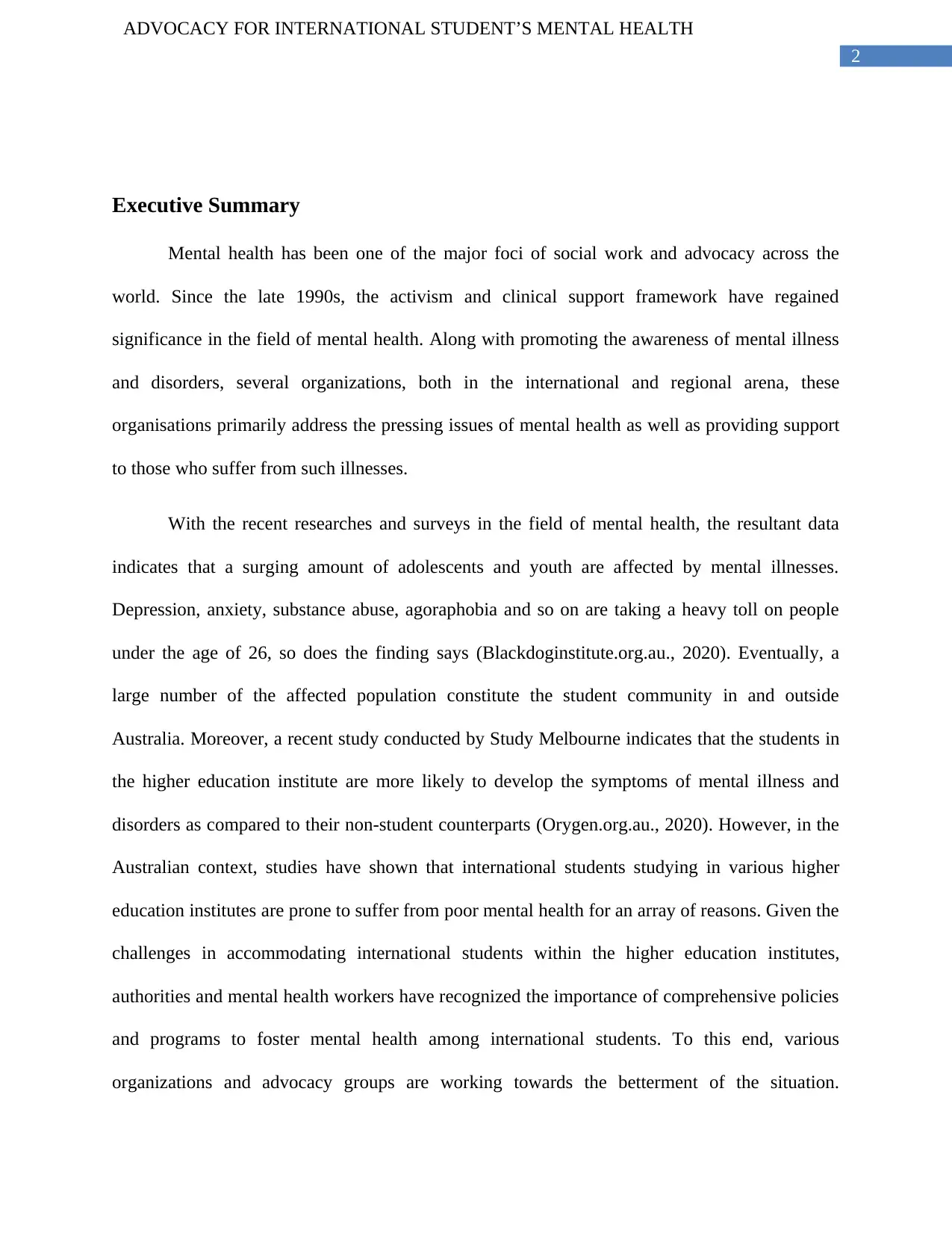
2
ADVOCACY FOR INTERNATIONAL STUDENT’S MENTAL HEALTH
Executive Summary
Mental health has been one of the major foci of social work and advocacy across the
world. Since the late 1990s, the activism and clinical support framework have regained
significance in the field of mental health. Along with promoting the awareness of mental illness
and disorders, several organizations, both in the international and regional arena, these
organisations primarily address the pressing issues of mental health as well as providing support
to those who suffer from such illnesses.
With the recent researches and surveys in the field of mental health, the resultant data
indicates that a surging amount of adolescents and youth are affected by mental illnesses.
Depression, anxiety, substance abuse, agoraphobia and so on are taking a heavy toll on people
under the age of 26, so does the finding says (Blackdoginstitute.org.au., 2020). Eventually, a
large number of the affected population constitute the student community in and outside
Australia. Moreover, a recent study conducted by Study Melbourne indicates that the students in
the higher education institute are more likely to develop the symptoms of mental illness and
disorders as compared to their non-student counterparts (Orygen.org.au., 2020). However, in the
Australian context, studies have shown that international students studying in various higher
education institutes are prone to suffer from poor mental health for an array of reasons. Given the
challenges in accommodating international students within the higher education institutes,
authorities and mental health workers have recognized the importance of comprehensive policies
and programs to foster mental health among international students. To this end, various
organizations and advocacy groups are working towards the betterment of the situation.
ADVOCACY FOR INTERNATIONAL STUDENT’S MENTAL HEALTH
Executive Summary
Mental health has been one of the major foci of social work and advocacy across the
world. Since the late 1990s, the activism and clinical support framework have regained
significance in the field of mental health. Along with promoting the awareness of mental illness
and disorders, several organizations, both in the international and regional arena, these
organisations primarily address the pressing issues of mental health as well as providing support
to those who suffer from such illnesses.
With the recent researches and surveys in the field of mental health, the resultant data
indicates that a surging amount of adolescents and youth are affected by mental illnesses.
Depression, anxiety, substance abuse, agoraphobia and so on are taking a heavy toll on people
under the age of 26, so does the finding says (Blackdoginstitute.org.au., 2020). Eventually, a
large number of the affected population constitute the student community in and outside
Australia. Moreover, a recent study conducted by Study Melbourne indicates that the students in
the higher education institute are more likely to develop the symptoms of mental illness and
disorders as compared to their non-student counterparts (Orygen.org.au., 2020). However, in the
Australian context, studies have shown that international students studying in various higher
education institutes are prone to suffer from poor mental health for an array of reasons. Given the
challenges in accommodating international students within the higher education institutes,
authorities and mental health workers have recognized the importance of comprehensive policies
and programs to foster mental health among international students. To this end, various
organizations and advocacy groups are working towards the betterment of the situation.
⊘ This is a preview!⊘
Do you want full access?
Subscribe today to unlock all pages.

Trusted by 1+ million students worldwide
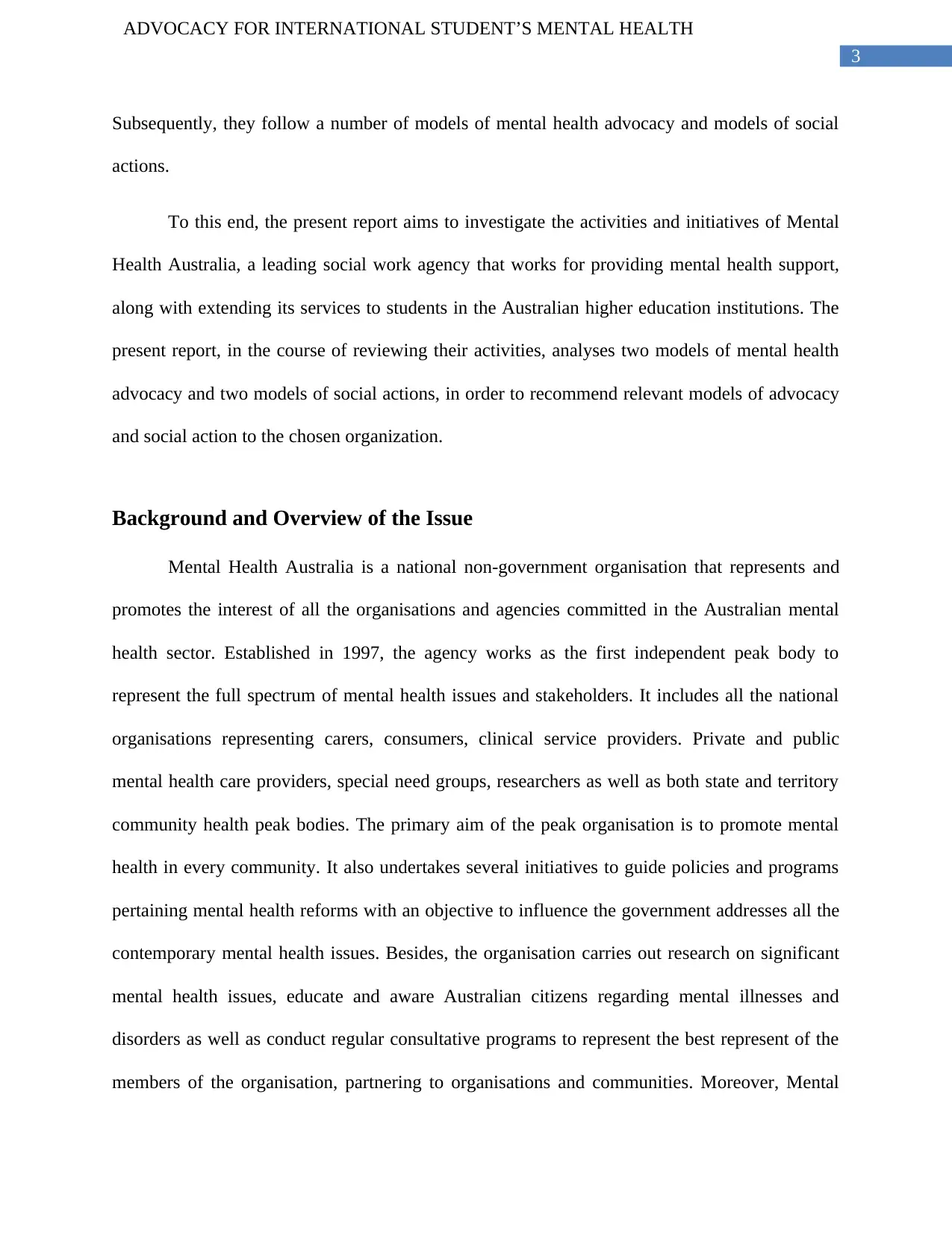
3
ADVOCACY FOR INTERNATIONAL STUDENT’S MENTAL HEALTH
Subsequently, they follow a number of models of mental health advocacy and models of social
actions.
To this end, the present report aims to investigate the activities and initiatives of Mental
Health Australia, a leading social work agency that works for providing mental health support,
along with extending its services to students in the Australian higher education institutions. The
present report, in the course of reviewing their activities, analyses two models of mental health
advocacy and two models of social actions, in order to recommend relevant models of advocacy
and social action to the chosen organization.
Background and Overview of the Issue
Mental Health Australia is a national non-government organisation that represents and
promotes the interest of all the organisations and agencies committed in the Australian mental
health sector. Established in 1997, the agency works as the first independent peak body to
represent the full spectrum of mental health issues and stakeholders. It includes all the national
organisations representing carers, consumers, clinical service providers. Private and public
mental health care providers, special need groups, researchers as well as both state and territory
community health peak bodies. The primary aim of the peak organisation is to promote mental
health in every community. It also undertakes several initiatives to guide policies and programs
pertaining mental health reforms with an objective to influence the government addresses all the
contemporary mental health issues. Besides, the organisation carries out research on significant
mental health issues, educate and aware Australian citizens regarding mental illnesses and
disorders as well as conduct regular consultative programs to represent the best represent of the
members of the organisation, partnering to organisations and communities. Moreover, Mental
ADVOCACY FOR INTERNATIONAL STUDENT’S MENTAL HEALTH
Subsequently, they follow a number of models of mental health advocacy and models of social
actions.
To this end, the present report aims to investigate the activities and initiatives of Mental
Health Australia, a leading social work agency that works for providing mental health support,
along with extending its services to students in the Australian higher education institutions. The
present report, in the course of reviewing their activities, analyses two models of mental health
advocacy and two models of social actions, in order to recommend relevant models of advocacy
and social action to the chosen organization.
Background and Overview of the Issue
Mental Health Australia is a national non-government organisation that represents and
promotes the interest of all the organisations and agencies committed in the Australian mental
health sector. Established in 1997, the agency works as the first independent peak body to
represent the full spectrum of mental health issues and stakeholders. It includes all the national
organisations representing carers, consumers, clinical service providers. Private and public
mental health care providers, special need groups, researchers as well as both state and territory
community health peak bodies. The primary aim of the peak organisation is to promote mental
health in every community. It also undertakes several initiatives to guide policies and programs
pertaining mental health reforms with an objective to influence the government addresses all the
contemporary mental health issues. Besides, the organisation carries out research on significant
mental health issues, educate and aware Australian citizens regarding mental illnesses and
disorders as well as conduct regular consultative programs to represent the best represent of the
members of the organisation, partnering to organisations and communities. Moreover, Mental
Paraphrase This Document
Need a fresh take? Get an instant paraphrase of this document with our AI Paraphraser
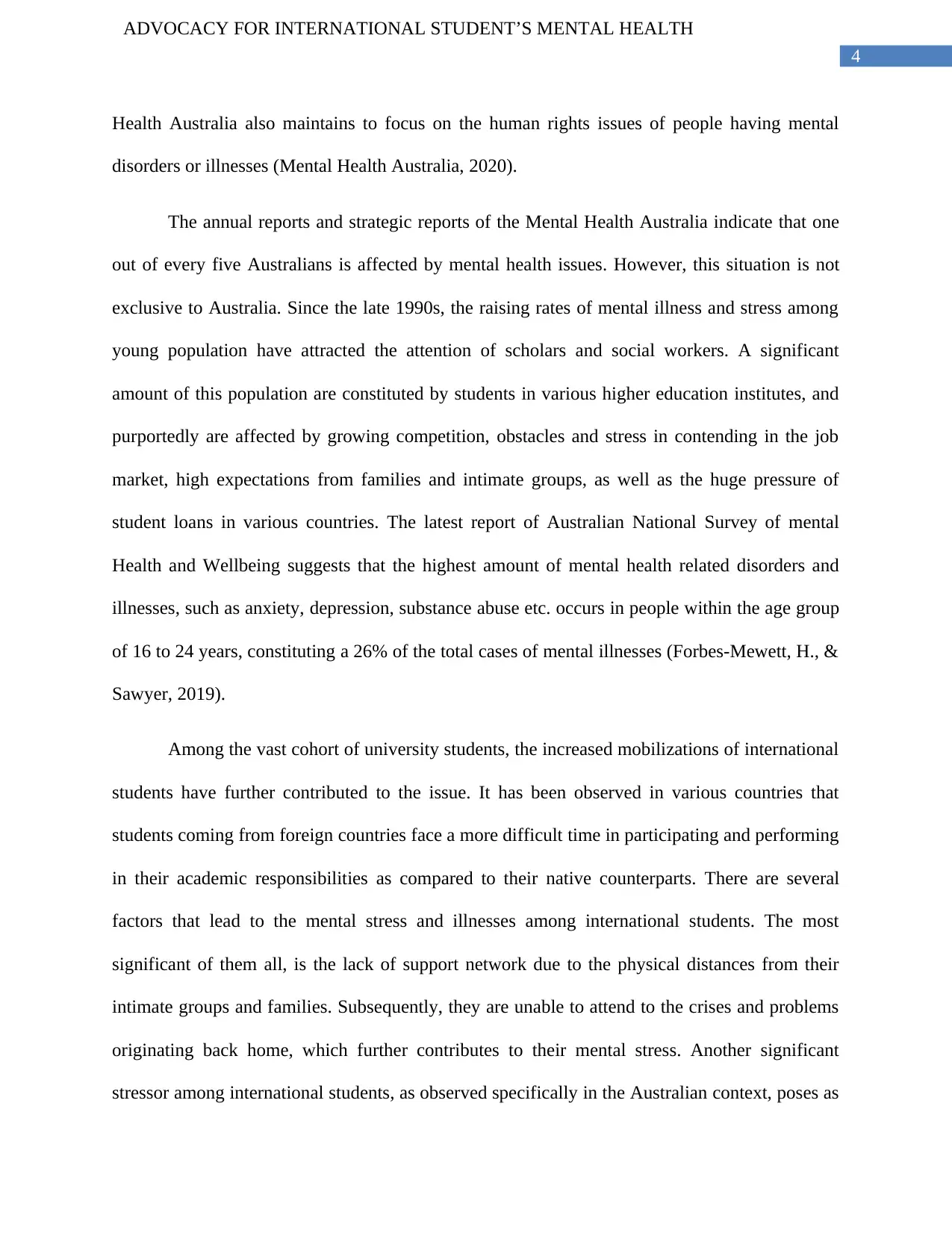
4
ADVOCACY FOR INTERNATIONAL STUDENT’S MENTAL HEALTH
Health Australia also maintains to focus on the human rights issues of people having mental
disorders or illnesses (Mental Health Australia, 2020).
The annual reports and strategic reports of the Mental Health Australia indicate that one
out of every five Australians is affected by mental health issues. However, this situation is not
exclusive to Australia. Since the late 1990s, the raising rates of mental illness and stress among
young population have attracted the attention of scholars and social workers. A significant
amount of this population are constituted by students in various higher education institutes, and
purportedly are affected by growing competition, obstacles and stress in contending in the job
market, high expectations from families and intimate groups, as well as the huge pressure of
student loans in various countries. The latest report of Australian National Survey of mental
Health and Wellbeing suggests that the highest amount of mental health related disorders and
illnesses, such as anxiety, depression, substance abuse etc. occurs in people within the age group
of 16 to 24 years, constituting a 26% of the total cases of mental illnesses (Forbes-Mewett, H., &
Sawyer, 2019).
Among the vast cohort of university students, the increased mobilizations of international
students have further contributed to the issue. It has been observed in various countries that
students coming from foreign countries face a more difficult time in participating and performing
in their academic responsibilities as compared to their native counterparts. There are several
factors that lead to the mental stress and illnesses among international students. The most
significant of them all, is the lack of support network due to the physical distances from their
intimate groups and families. Subsequently, they are unable to attend to the crises and problems
originating back home, which further contributes to their mental stress. Another significant
stressor among international students, as observed specifically in the Australian context, poses as
ADVOCACY FOR INTERNATIONAL STUDENT’S MENTAL HEALTH
Health Australia also maintains to focus on the human rights issues of people having mental
disorders or illnesses (Mental Health Australia, 2020).
The annual reports and strategic reports of the Mental Health Australia indicate that one
out of every five Australians is affected by mental health issues. However, this situation is not
exclusive to Australia. Since the late 1990s, the raising rates of mental illness and stress among
young population have attracted the attention of scholars and social workers. A significant
amount of this population are constituted by students in various higher education institutes, and
purportedly are affected by growing competition, obstacles and stress in contending in the job
market, high expectations from families and intimate groups, as well as the huge pressure of
student loans in various countries. The latest report of Australian National Survey of mental
Health and Wellbeing suggests that the highest amount of mental health related disorders and
illnesses, such as anxiety, depression, substance abuse etc. occurs in people within the age group
of 16 to 24 years, constituting a 26% of the total cases of mental illnesses (Forbes-Mewett, H., &
Sawyer, 2019).
Among the vast cohort of university students, the increased mobilizations of international
students have further contributed to the issue. It has been observed in various countries that
students coming from foreign countries face a more difficult time in participating and performing
in their academic responsibilities as compared to their native counterparts. There are several
factors that lead to the mental stress and illnesses among international students. The most
significant of them all, is the lack of support network due to the physical distances from their
intimate groups and families. Subsequently, they are unable to attend to the crises and problems
originating back home, which further contributes to their mental stress. Another significant
stressor among international students, as observed specifically in the Australian context, poses as
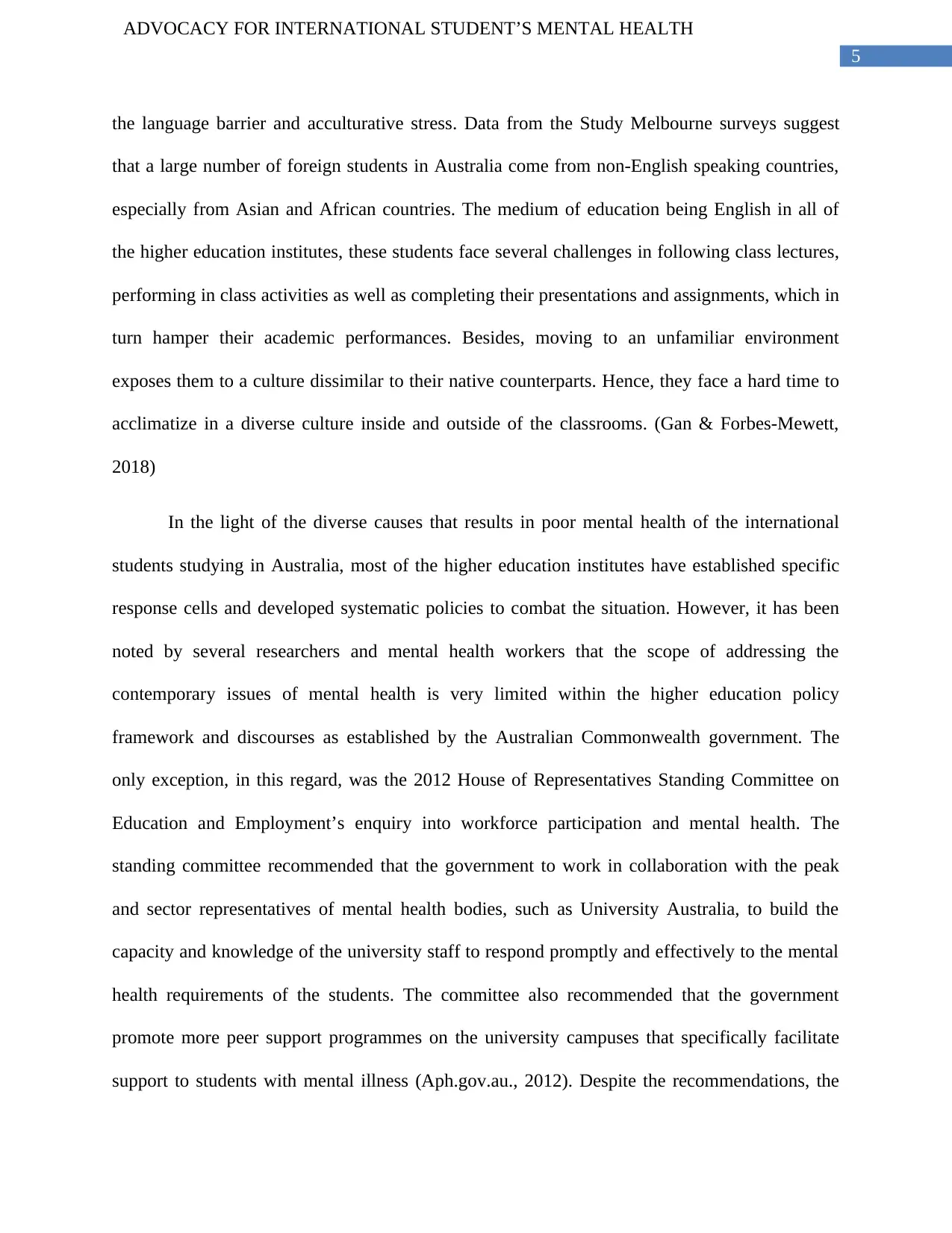
5
ADVOCACY FOR INTERNATIONAL STUDENT’S MENTAL HEALTH
the language barrier and acculturative stress. Data from the Study Melbourne surveys suggest
that a large number of foreign students in Australia come from non-English speaking countries,
especially from Asian and African countries. The medium of education being English in all of
the higher education institutes, these students face several challenges in following class lectures,
performing in class activities as well as completing their presentations and assignments, which in
turn hamper their academic performances. Besides, moving to an unfamiliar environment
exposes them to a culture dissimilar to their native counterparts. Hence, they face a hard time to
acclimatize in a diverse culture inside and outside of the classrooms. (Gan & Forbes-Mewett,
2018)
In the light of the diverse causes that results in poor mental health of the international
students studying in Australia, most of the higher education institutes have established specific
response cells and developed systematic policies to combat the situation. However, it has been
noted by several researchers and mental health workers that the scope of addressing the
contemporary issues of mental health is very limited within the higher education policy
framework and discourses as established by the Australian Commonwealth government. The
only exception, in this regard, was the 2012 House of Representatives Standing Committee on
Education and Employment’s enquiry into workforce participation and mental health. The
standing committee recommended that the government to work in collaboration with the peak
and sector representatives of mental health bodies, such as University Australia, to build the
capacity and knowledge of the university staff to respond promptly and effectively to the mental
health requirements of the students. The committee also recommended that the government
promote more peer support programmes on the university campuses that specifically facilitate
support to students with mental illness (Aph.gov.au., 2012). Despite the recommendations, the
ADVOCACY FOR INTERNATIONAL STUDENT’S MENTAL HEALTH
the language barrier and acculturative stress. Data from the Study Melbourne surveys suggest
that a large number of foreign students in Australia come from non-English speaking countries,
especially from Asian and African countries. The medium of education being English in all of
the higher education institutes, these students face several challenges in following class lectures,
performing in class activities as well as completing their presentations and assignments, which in
turn hamper their academic performances. Besides, moving to an unfamiliar environment
exposes them to a culture dissimilar to their native counterparts. Hence, they face a hard time to
acclimatize in a diverse culture inside and outside of the classrooms. (Gan & Forbes-Mewett,
2018)
In the light of the diverse causes that results in poor mental health of the international
students studying in Australia, most of the higher education institutes have established specific
response cells and developed systematic policies to combat the situation. However, it has been
noted by several researchers and mental health workers that the scope of addressing the
contemporary issues of mental health is very limited within the higher education policy
framework and discourses as established by the Australian Commonwealth government. The
only exception, in this regard, was the 2012 House of Representatives Standing Committee on
Education and Employment’s enquiry into workforce participation and mental health. The
standing committee recommended that the government to work in collaboration with the peak
and sector representatives of mental health bodies, such as University Australia, to build the
capacity and knowledge of the university staff to respond promptly and effectively to the mental
health requirements of the students. The committee also recommended that the government
promote more peer support programmes on the university campuses that specifically facilitate
support to students with mental illness (Aph.gov.au., 2012). Despite the recommendations, the
⊘ This is a preview!⊘
Do you want full access?
Subscribe today to unlock all pages.

Trusted by 1+ million students worldwide
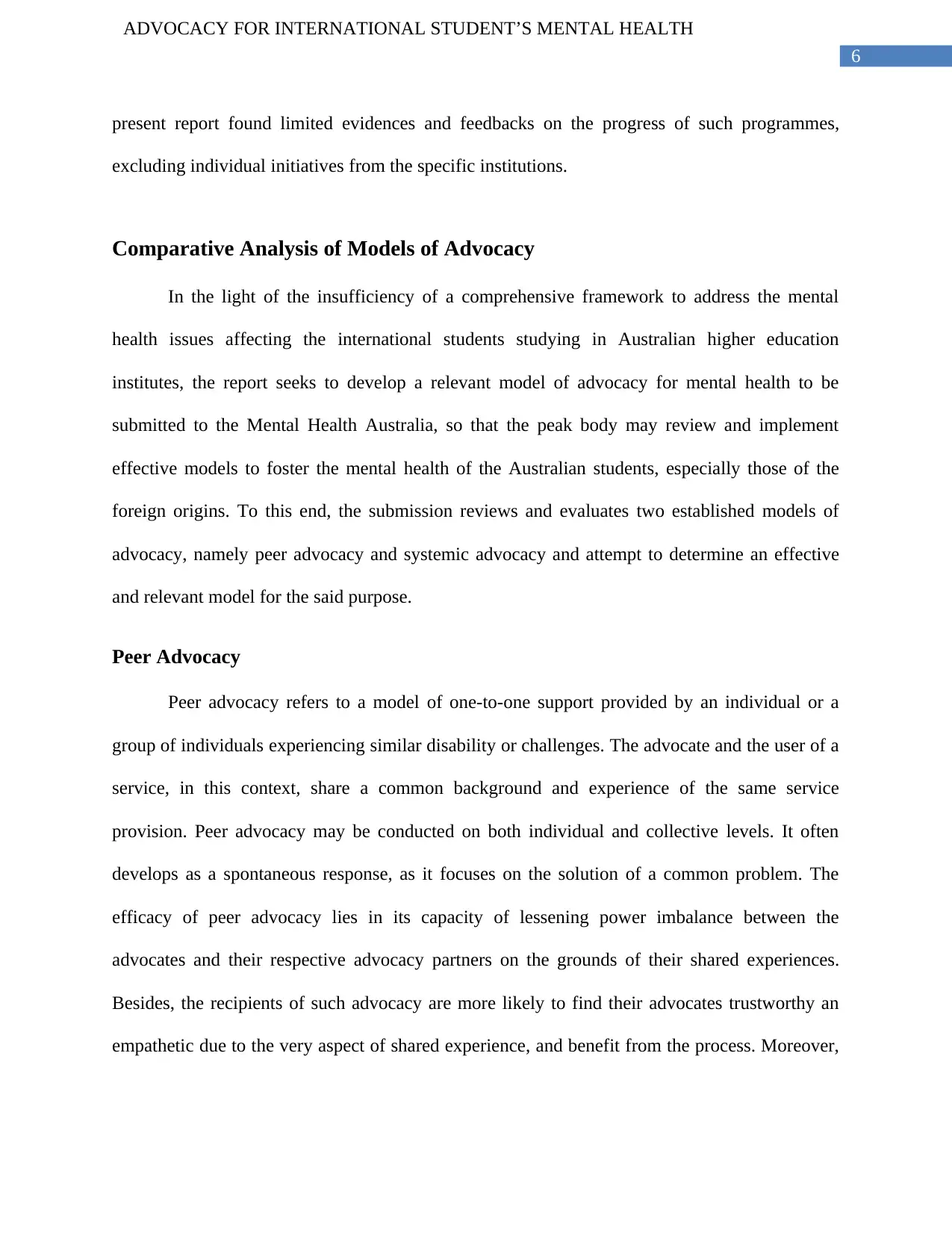
6
ADVOCACY FOR INTERNATIONAL STUDENT’S MENTAL HEALTH
present report found limited evidences and feedbacks on the progress of such programmes,
excluding individual initiatives from the specific institutions.
Comparative Analysis of Models of Advocacy
In the light of the insufficiency of a comprehensive framework to address the mental
health issues affecting the international students studying in Australian higher education
institutes, the report seeks to develop a relevant model of advocacy for mental health to be
submitted to the Mental Health Australia, so that the peak body may review and implement
effective models to foster the mental health of the Australian students, especially those of the
foreign origins. To this end, the submission reviews and evaluates two established models of
advocacy, namely peer advocacy and systemic advocacy and attempt to determine an effective
and relevant model for the said purpose.
Peer Advocacy
Peer advocacy refers to a model of one-to-one support provided by an individual or a
group of individuals experiencing similar disability or challenges. The advocate and the user of a
service, in this context, share a common background and experience of the same service
provision. Peer advocacy may be conducted on both individual and collective levels. It often
develops as a spontaneous response, as it focuses on the solution of a common problem. The
efficacy of peer advocacy lies in its capacity of lessening power imbalance between the
advocates and their respective advocacy partners on the grounds of their shared experiences.
Besides, the recipients of such advocacy are more likely to find their advocates trustworthy an
empathetic due to the very aspect of shared experience, and benefit from the process. Moreover,
ADVOCACY FOR INTERNATIONAL STUDENT’S MENTAL HEALTH
present report found limited evidences and feedbacks on the progress of such programmes,
excluding individual initiatives from the specific institutions.
Comparative Analysis of Models of Advocacy
In the light of the insufficiency of a comprehensive framework to address the mental
health issues affecting the international students studying in Australian higher education
institutes, the report seeks to develop a relevant model of advocacy for mental health to be
submitted to the Mental Health Australia, so that the peak body may review and implement
effective models to foster the mental health of the Australian students, especially those of the
foreign origins. To this end, the submission reviews and evaluates two established models of
advocacy, namely peer advocacy and systemic advocacy and attempt to determine an effective
and relevant model for the said purpose.
Peer Advocacy
Peer advocacy refers to a model of one-to-one support provided by an individual or a
group of individuals experiencing similar disability or challenges. The advocate and the user of a
service, in this context, share a common background and experience of the same service
provision. Peer advocacy may be conducted on both individual and collective levels. It often
develops as a spontaneous response, as it focuses on the solution of a common problem. The
efficacy of peer advocacy lies in its capacity of lessening power imbalance between the
advocates and their respective advocacy partners on the grounds of their shared experiences.
Besides, the recipients of such advocacy are more likely to find their advocates trustworthy an
empathetic due to the very aspect of shared experience, and benefit from the process. Moreover,
Paraphrase This Document
Need a fresh take? Get an instant paraphrase of this document with our AI Paraphraser
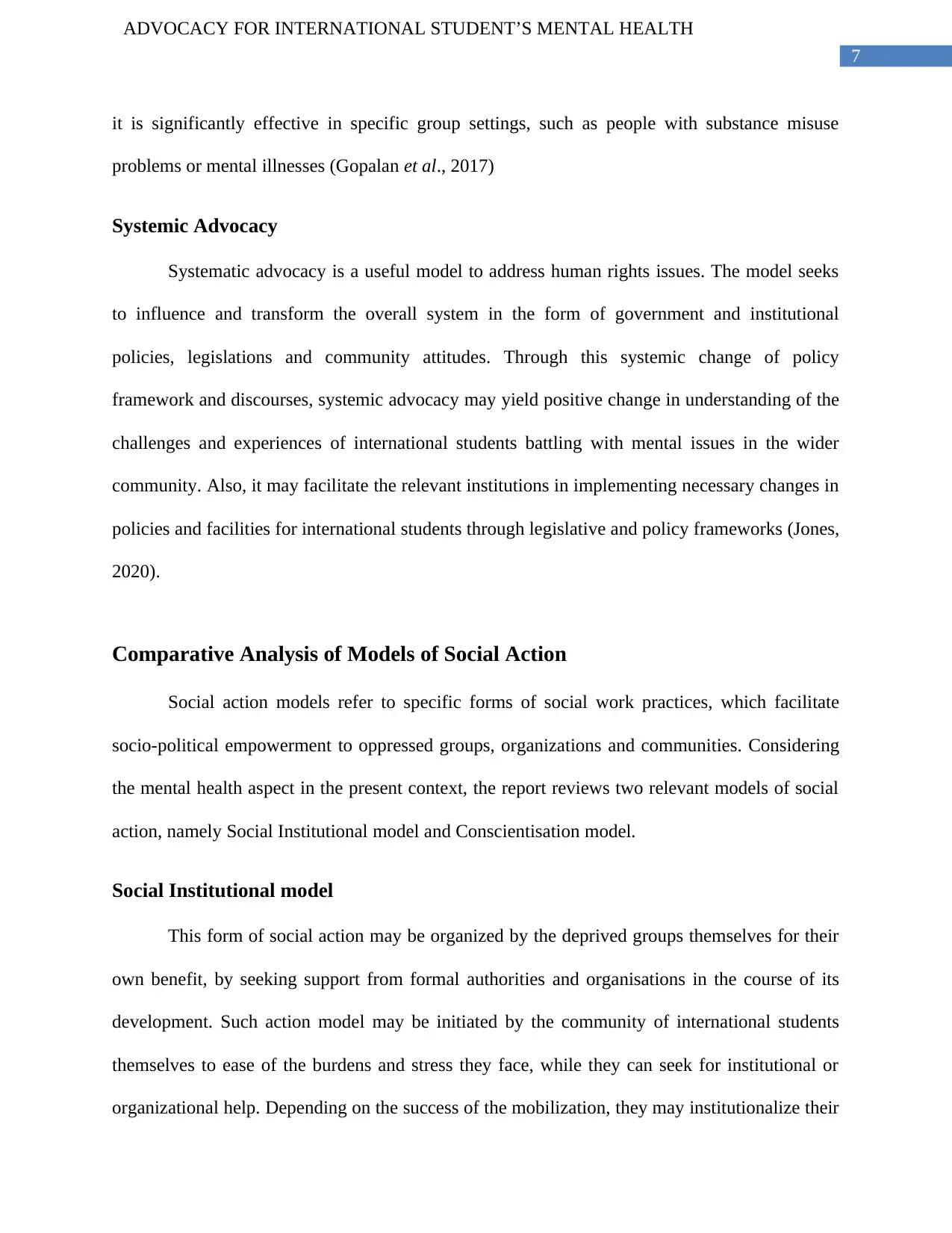
7
ADVOCACY FOR INTERNATIONAL STUDENT’S MENTAL HEALTH
it is significantly effective in specific group settings, such as people with substance misuse
problems or mental illnesses (Gopalan et al., 2017)
Systemic Advocacy
Systematic advocacy is a useful model to address human rights issues. The model seeks
to influence and transform the overall system in the form of government and institutional
policies, legislations and community attitudes. Through this systemic change of policy
framework and discourses, systemic advocacy may yield positive change in understanding of the
challenges and experiences of international students battling with mental issues in the wider
community. Also, it may facilitate the relevant institutions in implementing necessary changes in
policies and facilities for international students through legislative and policy frameworks (Jones,
2020).
Comparative Analysis of Models of Social Action
Social action models refer to specific forms of social work practices, which facilitate
socio-political empowerment to oppressed groups, organizations and communities. Considering
the mental health aspect in the present context, the report reviews two relevant models of social
action, namely Social Institutional model and Conscientisation model.
Social Institutional model
This form of social action may be organized by the deprived groups themselves for their
own benefit, by seeking support from formal authorities and organisations in the course of its
development. Such action model may be initiated by the community of international students
themselves to ease of the burdens and stress they face, while they can seek for institutional or
organizational help. Depending on the success of the mobilization, they may institutionalize their
ADVOCACY FOR INTERNATIONAL STUDENT’S MENTAL HEALTH
it is significantly effective in specific group settings, such as people with substance misuse
problems or mental illnesses (Gopalan et al., 2017)
Systemic Advocacy
Systematic advocacy is a useful model to address human rights issues. The model seeks
to influence and transform the overall system in the form of government and institutional
policies, legislations and community attitudes. Through this systemic change of policy
framework and discourses, systemic advocacy may yield positive change in understanding of the
challenges and experiences of international students battling with mental issues in the wider
community. Also, it may facilitate the relevant institutions in implementing necessary changes in
policies and facilities for international students through legislative and policy frameworks (Jones,
2020).
Comparative Analysis of Models of Social Action
Social action models refer to specific forms of social work practices, which facilitate
socio-political empowerment to oppressed groups, organizations and communities. Considering
the mental health aspect in the present context, the report reviews two relevant models of social
action, namely Social Institutional model and Conscientisation model.
Social Institutional model
This form of social action may be organized by the deprived groups themselves for their
own benefit, by seeking support from formal authorities and organisations in the course of its
development. Such action model may be initiated by the community of international students
themselves to ease of the burdens and stress they face, while they can seek for institutional or
organizational help. Depending on the success of the mobilization, they may institutionalize their
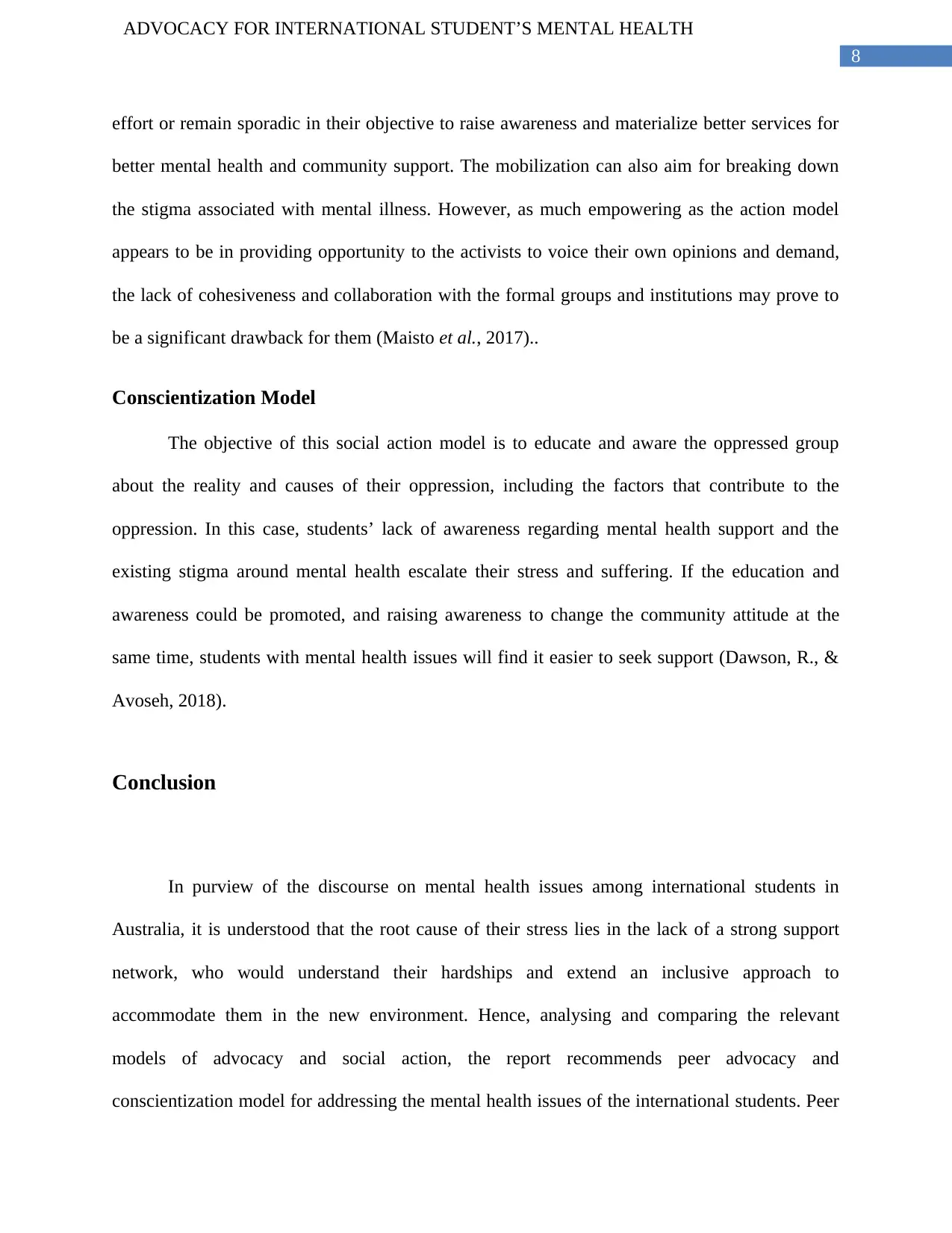
8
ADVOCACY FOR INTERNATIONAL STUDENT’S MENTAL HEALTH
effort or remain sporadic in their objective to raise awareness and materialize better services for
better mental health and community support. The mobilization can also aim for breaking down
the stigma associated with mental illness. However, as much empowering as the action model
appears to be in providing opportunity to the activists to voice their own opinions and demand,
the lack of cohesiveness and collaboration with the formal groups and institutions may prove to
be a significant drawback for them (Maisto et al., 2017)..
Conscientization Model
The objective of this social action model is to educate and aware the oppressed group
about the reality and causes of their oppression, including the factors that contribute to the
oppression. In this case, students’ lack of awareness regarding mental health support and the
existing stigma around mental health escalate their stress and suffering. If the education and
awareness could be promoted, and raising awareness to change the community attitude at the
same time, students with mental health issues will find it easier to seek support (Dawson, R., &
Avoseh, 2018).
Conclusion
In purview of the discourse on mental health issues among international students in
Australia, it is understood that the root cause of their stress lies in the lack of a strong support
network, who would understand their hardships and extend an inclusive approach to
accommodate them in the new environment. Hence, analysing and comparing the relevant
models of advocacy and social action, the report recommends peer advocacy and
conscientization model for addressing the mental health issues of the international students. Peer
ADVOCACY FOR INTERNATIONAL STUDENT’S MENTAL HEALTH
effort or remain sporadic in their objective to raise awareness and materialize better services for
better mental health and community support. The mobilization can also aim for breaking down
the stigma associated with mental illness. However, as much empowering as the action model
appears to be in providing opportunity to the activists to voice their own opinions and demand,
the lack of cohesiveness and collaboration with the formal groups and institutions may prove to
be a significant drawback for them (Maisto et al., 2017)..
Conscientization Model
The objective of this social action model is to educate and aware the oppressed group
about the reality and causes of their oppression, including the factors that contribute to the
oppression. In this case, students’ lack of awareness regarding mental health support and the
existing stigma around mental health escalate their stress and suffering. If the education and
awareness could be promoted, and raising awareness to change the community attitude at the
same time, students with mental health issues will find it easier to seek support (Dawson, R., &
Avoseh, 2018).
Conclusion
In purview of the discourse on mental health issues among international students in
Australia, it is understood that the root cause of their stress lies in the lack of a strong support
network, who would understand their hardships and extend an inclusive approach to
accommodate them in the new environment. Hence, analysing and comparing the relevant
models of advocacy and social action, the report recommends peer advocacy and
conscientization model for addressing the mental health issues of the international students. Peer
⊘ This is a preview!⊘
Do you want full access?
Subscribe today to unlock all pages.

Trusted by 1+ million students worldwide
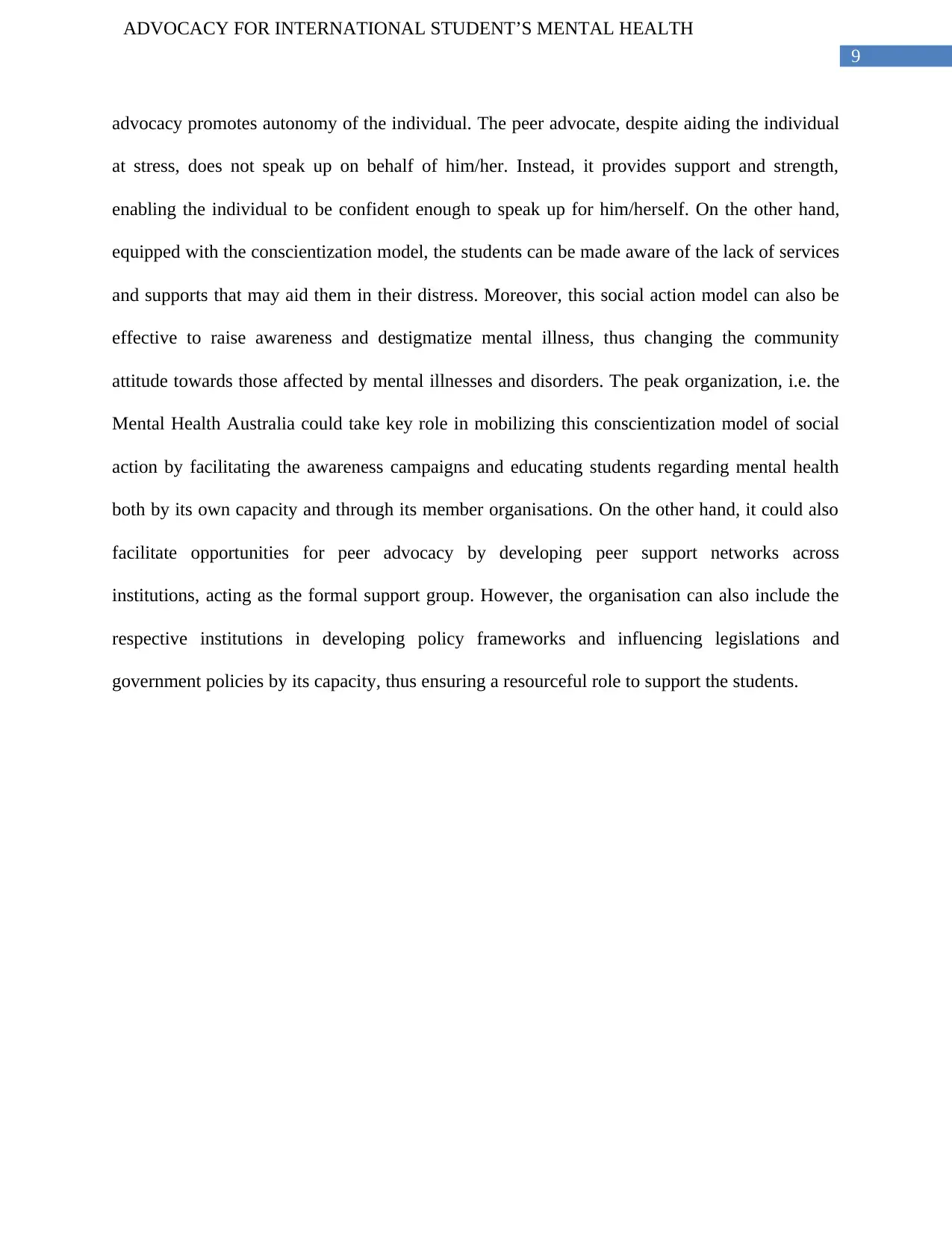
9
ADVOCACY FOR INTERNATIONAL STUDENT’S MENTAL HEALTH
advocacy promotes autonomy of the individual. The peer advocate, despite aiding the individual
at stress, does not speak up on behalf of him/her. Instead, it provides support and strength,
enabling the individual to be confident enough to speak up for him/herself. On the other hand,
equipped with the conscientization model, the students can be made aware of the lack of services
and supports that may aid them in their distress. Moreover, this social action model can also be
effective to raise awareness and destigmatize mental illness, thus changing the community
attitude towards those affected by mental illnesses and disorders. The peak organization, i.e. the
Mental Health Australia could take key role in mobilizing this conscientization model of social
action by facilitating the awareness campaigns and educating students regarding mental health
both by its own capacity and through its member organisations. On the other hand, it could also
facilitate opportunities for peer advocacy by developing peer support networks across
institutions, acting as the formal support group. However, the organisation can also include the
respective institutions in developing policy frameworks and influencing legislations and
government policies by its capacity, thus ensuring a resourceful role to support the students.
ADVOCACY FOR INTERNATIONAL STUDENT’S MENTAL HEALTH
advocacy promotes autonomy of the individual. The peer advocate, despite aiding the individual
at stress, does not speak up on behalf of him/her. Instead, it provides support and strength,
enabling the individual to be confident enough to speak up for him/herself. On the other hand,
equipped with the conscientization model, the students can be made aware of the lack of services
and supports that may aid them in their distress. Moreover, this social action model can also be
effective to raise awareness and destigmatize mental illness, thus changing the community
attitude towards those affected by mental illnesses and disorders. The peak organization, i.e. the
Mental Health Australia could take key role in mobilizing this conscientization model of social
action by facilitating the awareness campaigns and educating students regarding mental health
both by its own capacity and through its member organisations. On the other hand, it could also
facilitate opportunities for peer advocacy by developing peer support networks across
institutions, acting as the formal support group. However, the organisation can also include the
respective institutions in developing policy frameworks and influencing legislations and
government policies by its capacity, thus ensuring a resourceful role to support the students.
Paraphrase This Document
Need a fresh take? Get an instant paraphrase of this document with our AI Paraphraser
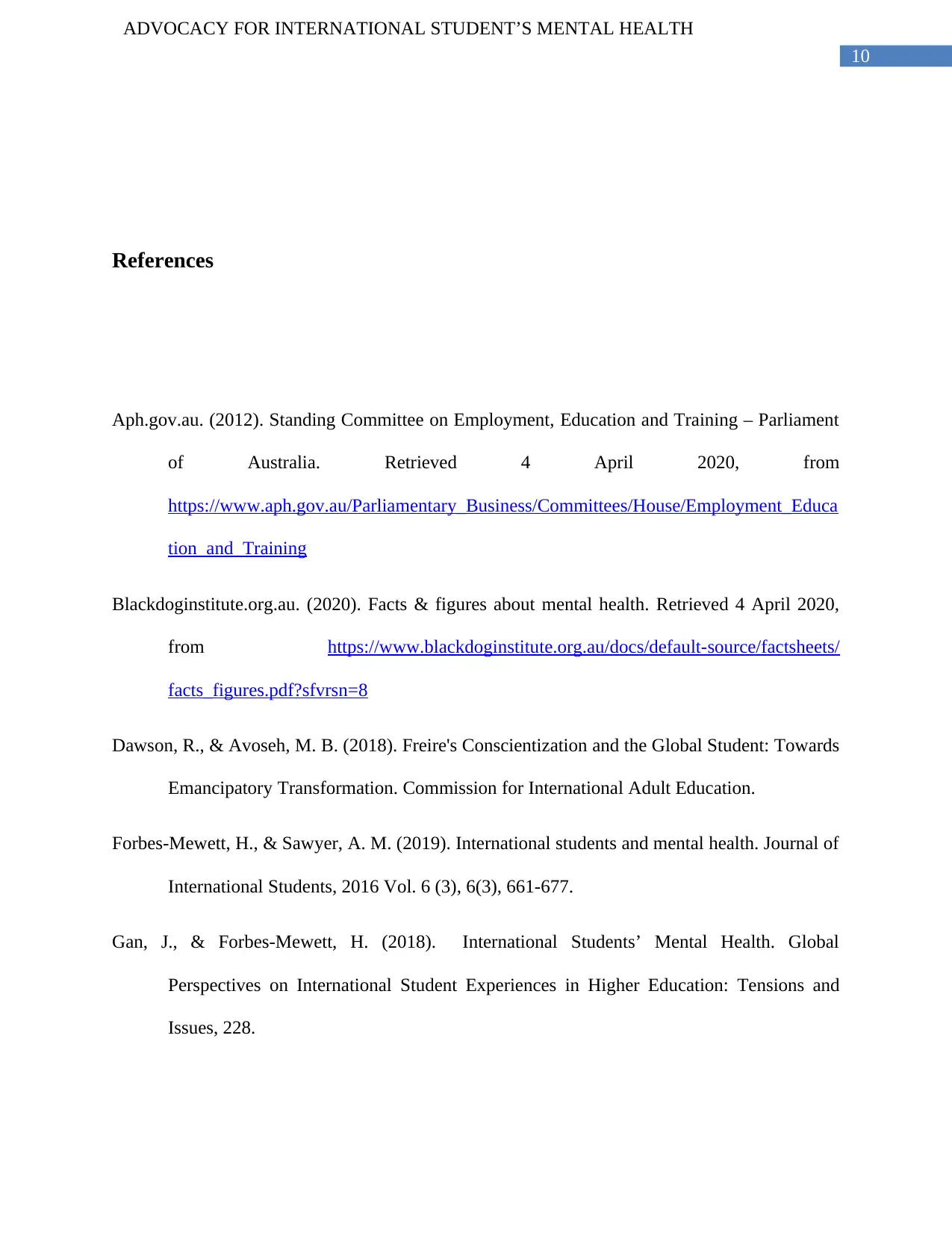
10
ADVOCACY FOR INTERNATIONAL STUDENT’S MENTAL HEALTH
References
Aph.gov.au. (2012). Standing Committee on Employment, Education and Training – Parliament
of Australia. Retrieved 4 April 2020, from
https://www.aph.gov.au/Parliamentary_Business/Committees/House/Employment_Educa
tion_and_Training
Blackdoginstitute.org.au. (2020). Facts & figures about mental health. Retrieved 4 April 2020,
from https://www.blackdoginstitute.org.au/docs/default-source/factsheets/
facts_figures.pdf?sfvrsn=8
Dawson, R., & Avoseh, M. B. (2018). Freire's Conscientization and the Global Student: Towards
Emancipatory Transformation. Commission for International Adult Education.
Forbes-Mewett, H., & Sawyer, A. M. (2019). International students and mental health. Journal of
International Students, 2016 Vol. 6 (3), 6(3), 661-677.
Gan, J., & Forbes-Mewett, H. (2018). International Students’ Mental Health. Global
Perspectives on International Student Experiences in Higher Education: Tensions and
Issues, 228.
ADVOCACY FOR INTERNATIONAL STUDENT’S MENTAL HEALTH
References
Aph.gov.au. (2012). Standing Committee on Employment, Education and Training – Parliament
of Australia. Retrieved 4 April 2020, from
https://www.aph.gov.au/Parliamentary_Business/Committees/House/Employment_Educa
tion_and_Training
Blackdoginstitute.org.au. (2020). Facts & figures about mental health. Retrieved 4 April 2020,
from https://www.blackdoginstitute.org.au/docs/default-source/factsheets/
facts_figures.pdf?sfvrsn=8
Dawson, R., & Avoseh, M. B. (2018). Freire's Conscientization and the Global Student: Towards
Emancipatory Transformation. Commission for International Adult Education.
Forbes-Mewett, H., & Sawyer, A. M. (2019). International students and mental health. Journal of
International Students, 2016 Vol. 6 (3), 6(3), 661-677.
Gan, J., & Forbes-Mewett, H. (2018). International Students’ Mental Health. Global
Perspectives on International Student Experiences in Higher Education: Tensions and
Issues, 228.
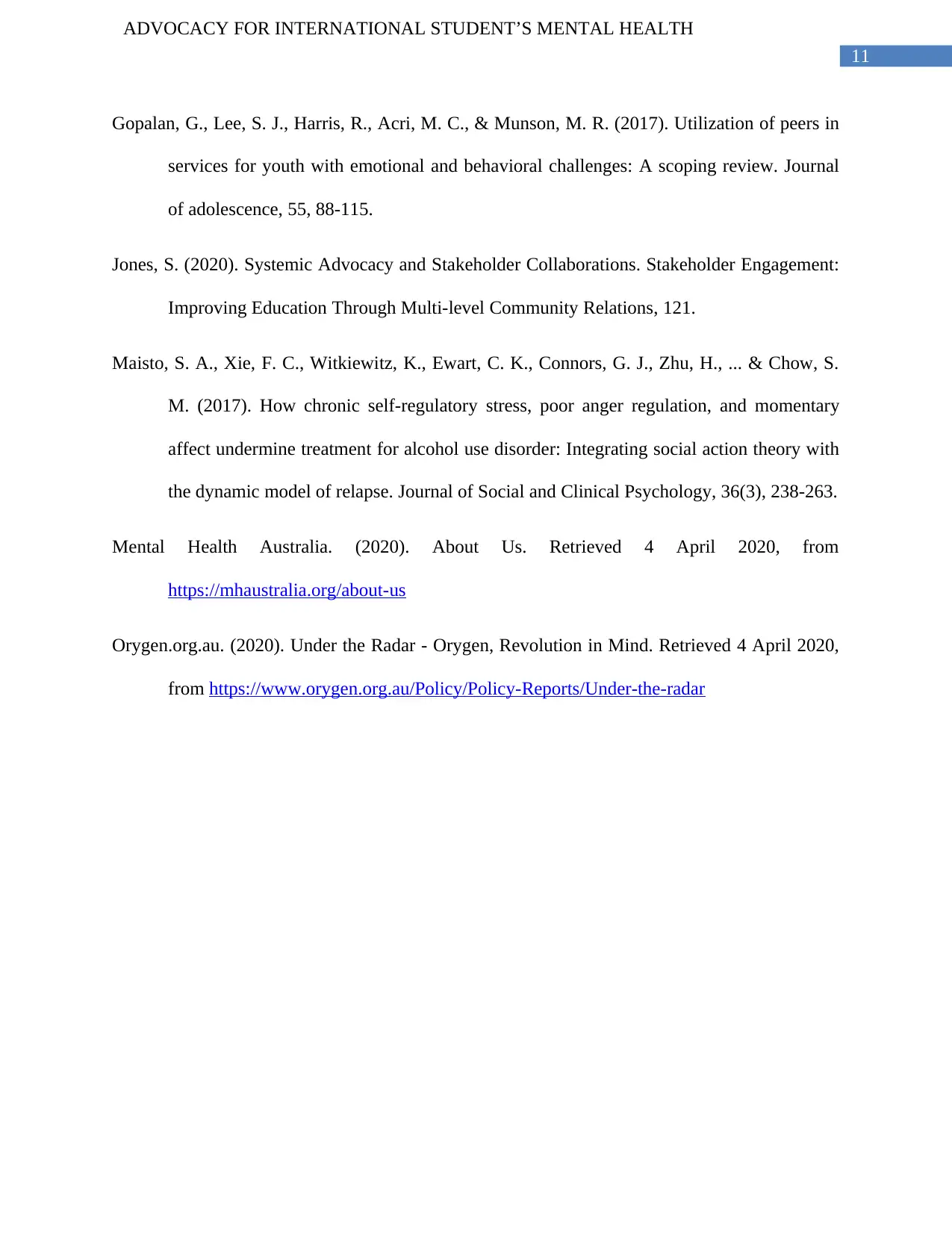
11
ADVOCACY FOR INTERNATIONAL STUDENT’S MENTAL HEALTH
Gopalan, G., Lee, S. J., Harris, R., Acri, M. C., & Munson, M. R. (2017). Utilization of peers in
services for youth with emotional and behavioral challenges: A scoping review. Journal
of adolescence, 55, 88-115.
Jones, S. (2020). Systemic Advocacy and Stakeholder Collaborations. Stakeholder Engagement:
Improving Education Through Multi-level Community Relations, 121.
Maisto, S. A., Xie, F. C., Witkiewitz, K., Ewart, C. K., Connors, G. J., Zhu, H., ... & Chow, S.
M. (2017). How chronic self-regulatory stress, poor anger regulation, and momentary
affect undermine treatment for alcohol use disorder: Integrating social action theory with
the dynamic model of relapse. Journal of Social and Clinical Psychology, 36(3), 238-263.
Mental Health Australia. (2020). About Us. Retrieved 4 April 2020, from
https://mhaustralia.org/about-us
Orygen.org.au. (2020). Under the Radar - Orygen, Revolution in Mind. Retrieved 4 April 2020,
from https://www.orygen.org.au/Policy/Policy-Reports/Under-the-radar
ADVOCACY FOR INTERNATIONAL STUDENT’S MENTAL HEALTH
Gopalan, G., Lee, S. J., Harris, R., Acri, M. C., & Munson, M. R. (2017). Utilization of peers in
services for youth with emotional and behavioral challenges: A scoping review. Journal
of adolescence, 55, 88-115.
Jones, S. (2020). Systemic Advocacy and Stakeholder Collaborations. Stakeholder Engagement:
Improving Education Through Multi-level Community Relations, 121.
Maisto, S. A., Xie, F. C., Witkiewitz, K., Ewart, C. K., Connors, G. J., Zhu, H., ... & Chow, S.
M. (2017). How chronic self-regulatory stress, poor anger regulation, and momentary
affect undermine treatment for alcohol use disorder: Integrating social action theory with
the dynamic model of relapse. Journal of Social and Clinical Psychology, 36(3), 238-263.
Mental Health Australia. (2020). About Us. Retrieved 4 April 2020, from
https://mhaustralia.org/about-us
Orygen.org.au. (2020). Under the Radar - Orygen, Revolution in Mind. Retrieved 4 April 2020,
from https://www.orygen.org.au/Policy/Policy-Reports/Under-the-radar
⊘ This is a preview!⊘
Do you want full access?
Subscribe today to unlock all pages.

Trusted by 1+ million students worldwide
1 out of 12
Related Documents
Your All-in-One AI-Powered Toolkit for Academic Success.
+13062052269
info@desklib.com
Available 24*7 on WhatsApp / Email
![[object Object]](/_next/static/media/star-bottom.7253800d.svg)
Unlock your academic potential
Copyright © 2020–2026 A2Z Services. All Rights Reserved. Developed and managed by ZUCOL.





